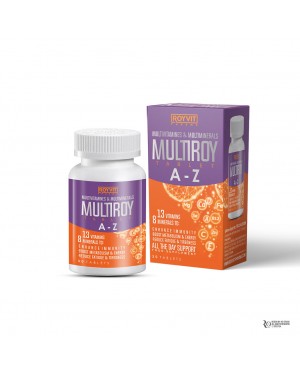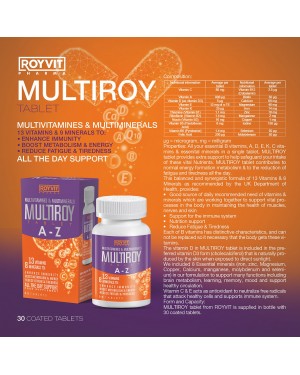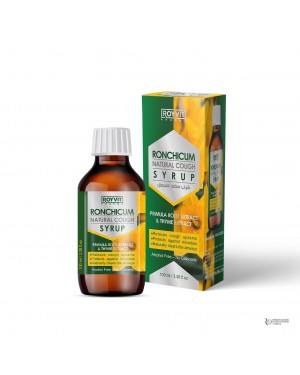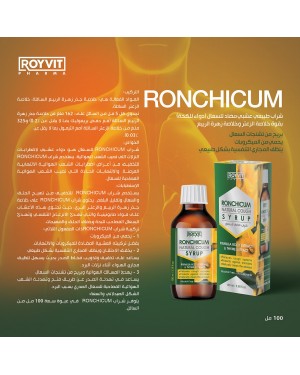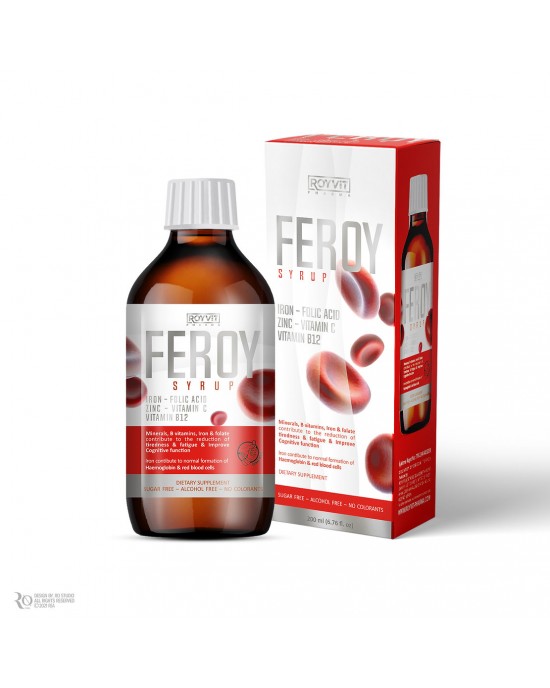
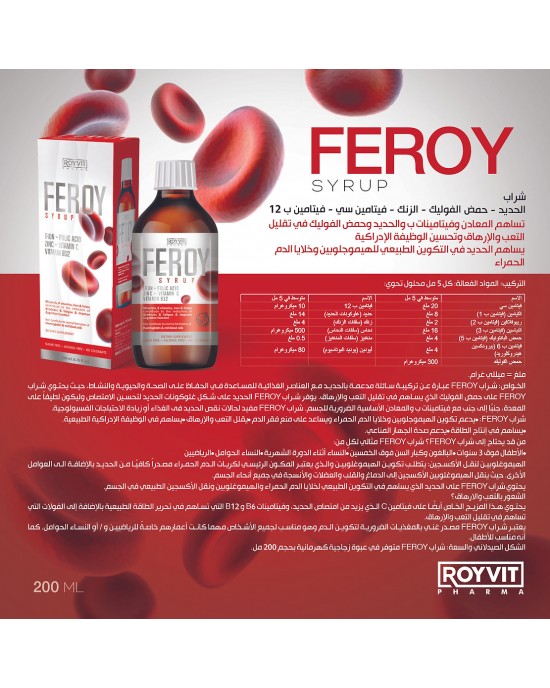
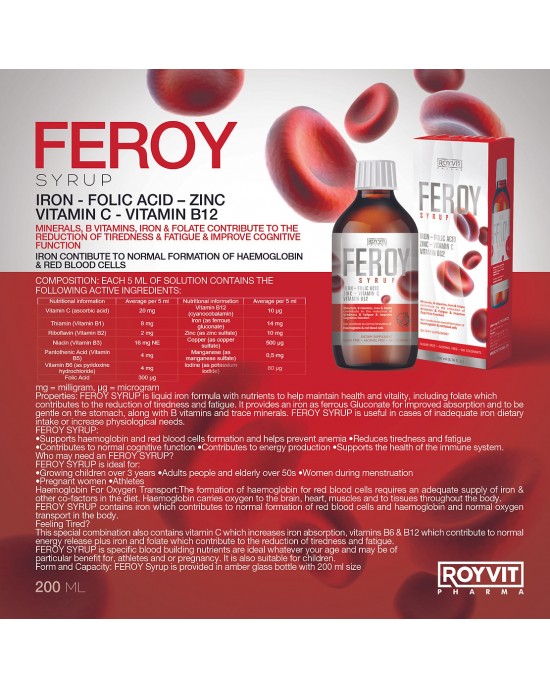



- Comprehensive Iron Supplement: FeRoy Iron Syrup provides a powerful blend of iron, folic acid, zinc, and essential vitamins to support overall health and vitality.
- Enhanced Absorption: Featuring iron in the form of ferrous gluconate, FeRoy Iron Syrup ensures improved absorption and is gentle on the stomach, minimizing gastrointestinal discomfort.
- Reduces Fatigue and Tiredness: With the inclusion of folic acid and B vitamins, this syrup effectively reduces tiredness and fatigue, promoting sustained energy levels throughout the day.
- Supports Immune System: The combination of vitamins and trace minerals in FeRoy Iron Syrup enhances immune function, helping your body to ward off infections and stay healthy.
- Ideal for Various Age Groups: Suitable for children over 3 years, adults, elderly, pregnant women, and athletes, making it a versatile supplement for the whole family.
- Easy to Use: Provided in a convenient 200 ml amber glass bottle, FeRoy Iron Syrup is easy to dose and incorporate into your daily routine for maximum benefits.
- Stock: In Stock
- Brand: Royvit Pharma
- Model: royvit-032
FeRoy Iron Syrup: Boost Your Health and Vitality with Essential Nutrients
FeRoy Iron Syrup is a liquid iron formula that provides essential nutrients to maintain health and vitality. This iron syrup contains ferrous gluconate for improved absorption, making it gentle on the stomach. With the addition of folate, FeRoy Iron Syrup effectively reduces tiredness and fatigue, supporting haemoglobin and red blood cell formation. This powerful blend of B vitamins and trace minerals contributes to normal cognitive function, energy production, and a robust immune system. Ideal for growing children, adults, the elderly, women during menstruation and pregnancy, and athletes, FeRoy Iron Syrup is your go-to solution for boosting haemoglobin levels and ensuring optimal oxygen transport in the body.
FeRoy Iron Syrup: Iron, Folic Acid, Zinc, Vitamin C, Vitamin B12, Thiamin, Riboflavin, Niacin, Copper, Pantothenic Acid, Manganese, Vitamin B6, Iodine
FeRoy Iron Syrup is a vital supplement for the human body, offering a comprehensive range of nutrients necessary for overall well-being. Iron, folic acid, and zinc work together to support the formation of haemoglobin and red blood cells, which are crucial for transporting oxygen throughout the body. Vitamin C enhances the absorption of iron, while B vitamins, including B12, Thiamin, Riboflavin, Niacin, Pantothenic Acid, and Vitamin B6, play a significant role in energy production, cognitive function, and reducing fatigue. Copper and manganese contribute to the maintenance of normal connective tissues, and iodine supports normal cognitive and neurological function. This well-rounded formula ensures that your body gets the essential nutrients it needs to stay healthy, energetic, and resilient.
Who Can Benefit from FeRoy Iron Syrup?
FeRoy Iron Syrup is specially formulated to cater to a wide range of individuals, ensuring that everyone gets the iron and essential nutrients they need for optimal health. This syrup is suitable for growing children over 3 years old, helping them in their crucial development stages by supporting cognitive function and energy production. Adults and the elderly over 50s can benefit from FeRoy Iron Syrup as it helps maintain haemoglobin levels, reducing tiredness and fatigue, and supporting overall vitality. Women during menstruation and pregnancy can find relief with FeRoy Iron Syrup, as it replenishes iron lost during these periods and supports the increased nutritional demands of pregnancy. Athletes, who require more iron due to intense physical activities, can also benefit from this product as it helps in the formation of red blood cells and improves oxygen transport, enhancing their performance and endurance. FeRoy Iron Syrup is a versatile supplement that addresses the nutritional needs of diverse age groups and lifestyles, making it an essential addition to your daily health regimen.
Benefits of Iron (as Ferrous Gluconate)
Iron, particularly in the form of ferrous gluconate, is a crucial nutrient for maintaining healthy red blood cells and ensuring efficient oxygen transport throughout the body. Iron is essential for the formation of haemoglobin, the protein in red blood cells that carries oxygen from the lungs to the rest of the body. According to the National Institutes of Health (NIH), adequate iron levels can help prevent iron deficiency anemia, which can lead to fatigue, weakness, and impaired cognitive function. Additionally, iron supports the body's energy metabolism, helping to convert nutrients into usable energy, which is particularly important for maintaining overall vitality and reducing tiredness and fatigue.
Benefits of Folic Acid
Folic acid, a form of vitamin B9, plays a vital role in DNA synthesis and repair, cell division, and growth. This nutrient is especially important for pregnant women as it helps prevent neural tube defects in developing fetuses. The Centers for Disease Control and Prevention (CDC) recommend folic acid supplementation for women of childbearing age to support a healthy pregnancy. Beyond pregnancy, folic acid also contributes to reducing levels of homocysteine in the blood, which can lower the risk of cardiovascular diseases. Furthermore, folic acid works synergistically with other B vitamins to support cognitive function and reduce symptoms of depression and anxiety.
Benefits of Zinc (as Zinc Sulfate)
Zinc is an essential trace mineral that supports numerous physiological functions, including immune system health, protein synthesis, and DNA synthesis. According to Harvard T.H. Chan School of Public Health, zinc plays a critical role in maintaining the integrity of the immune system, helping to ward off infections and illnesses. Zinc is also involved in wound healing and the maintenance of healthy skin. Additionally, zinc supports normal growth and development during pregnancy, childhood, and adolescence, making it an important nutrient for growing children. Zinc's role in maintaining a healthy sense of taste and smell further highlights its importance in overall health.
Benefits of Vitamin C (Ascorbic Acid)
Vitamin C, also known as ascorbic acid, is a powerful antioxidant that protects the body's cells from damage caused by free radicals. This vitamin is crucial for the synthesis of collagen, a protein that helps maintain the integrity of skin, blood vessels, bones, and connective tissues. According to the Mayo Clinic, vitamin C enhances the absorption of non-heme iron (the form of iron found in plant-based foods) from the digestive tract, making it an important nutrient for preventing iron deficiency anemia. Additionally, vitamin C supports the immune system, helping the body to fight off infections and reduce the duration of common colds.
Benefits of Vitamin B12 (Cyanocobalamin)
Vitamin B12, also known as cyanocobalamin, is essential for maintaining healthy nerve cells and red blood cells. It plays a critical role in DNA synthesis and the production of myelin, a protective coating around nerves. According to the National Institutes of Health (NIH), vitamin B12 deficiency can lead to megaloblastic anemia, characterized by large and abnormal red blood cells, and can cause neurological issues such as numbness and tingling in the hands and feet. Vitamin B12 is also crucial for cognitive function, helping to prevent memory loss and cognitive decline associated with aging. Additionally, adequate levels of vitamin B12 can improve mood and energy levels, contributing to overall well-being.
Benefits of Thiamin (Vitamin B1)
Thiamin, or vitamin B1, is essential for energy metabolism and the proper functioning of the nervous system. This vitamin plays a key role in converting carbohydrates into energy, which is crucial for maintaining physical and mental energy levels. According to the Linus Pauling Institute, thiamin is also involved in the synthesis of neurotransmitters, which are essential for communication between nerve cells. Deficiency in thiamin can lead to beriberi, a condition characterized by weakness, confusion, and cardiovascular problems. Thiamin is particularly important for athletes and individuals with high energy demands, as it helps to ensure efficient energy production and utilization.
Benefits of Riboflavin (Vitamin B2)
Riboflavin, or vitamin B2, is crucial for energy production and cellular function. It plays a vital role in the metabolism of fats, proteins, and carbohydrates, converting them into usable energy. According to the National Institutes of Health (NIH), riboflavin is also an important antioxidant, protecting cells from oxidative stress and damage. This vitamin is essential for the production of red blood cells and the maintenance of healthy skin and eyes. Riboflavin deficiency can lead to symptoms such as sore throat, redness and swelling of the lining of the mouth and throat, and skin disorders. Ensuring adequate intake of riboflavin supports overall health and vitality.
Benefits of Niacin (Vitamin B3)
Niacin, also known as vitamin B3, is essential for energy metabolism and the proper functioning of the digestive system, skin, and nerves. It plays a key role in converting food into energy and maintaining healthy cholesterol levels. According to the Mayo Clinic, niacin helps to lower LDL (bad) cholesterol and triglycerides, while raising HDL (good) cholesterol, reducing the risk of cardiovascular diseases. Niacin is also involved in DNA repair and the production of stress and sex hormones in the adrenal glands. Deficiency in niacin can lead to pellagra, characterized by dermatitis, diarrhea, and dementia. Ensuring adequate niacin intake supports overall metabolic health and well-being.
Benefits of Copper (as Copper Sulfate)
Copper is an essential trace mineral that plays a crucial role in various bodily functions, including the formation of red blood cells, the maintenance of healthy bones and connective tissues, and the functioning of the immune system. According to the Linus Pauling Institute, copper is involved in the production of hemoglobin and the absorption and utilization of iron, making it important for preventing anemia. Copper also acts as an antioxidant, protecting cells from damage caused by free radicals. Additionally, copper supports the formation of collagen and elastin, essential proteins for maintaining the structure and elasticity of the skin, blood vessels, and bones.
Benefits of Pantothenic Acid (Vitamin B5)
Pantothenic acid, or vitamin B5, is essential for the synthesis and metabolism of carbohydrates, proteins, and fats. It plays a critical role in the production of coenzyme A, which is involved in numerous biochemical reactions that generate energy and synthesize fatty acids and cholesterol. According to the National Institutes of Health (NIH), pantothenic acid is also involved in the synthesis of neurotransmitters, steroid hormones, and hemoglobin. This vitamin supports healthy skin, hair, and eyes, and helps the body to cope with stress by supporting the adrenal glands. Deficiency in pantothenic acid can lead to symptoms such as fatigue, irritability, and numbness.
Benefits of Manganese (as Manganese Sulfate)
Manganese is an essential trace mineral involved in the metabolism of amino acids, carbohydrates, and cholesterol. It plays a vital role in bone formation, blood clotting, and reducing inflammation. According to the Linus Pauling Institute, manganese is also a component of the antioxidant enzyme superoxide dismutase (SOD), which protects cells from oxidative stress. Manganese supports the production of collagen, important for wound healing and maintaining the structure of skin and bones. Additionally, manganese is necessary for the proper functioning of the brain and nervous system, contributing to cognitive health and mental well-being.
Benefits of Vitamin B6 (as Pyridoxine Hydrochloride)
Vitamin B6, or pyridoxine hydrochloride, is crucial for brain development and function, as well as the production of the neurotransmitters serotonin and norepinephrine. According to the National Institutes of Health (NIH), vitamin B6 is involved in over 100 enzyme reactions related to metabolism. It plays a key role in the synthesis of hemoglobin, the protein in red blood cells that carries oxygen throughout the body. Vitamin B6 also supports immune function by promoting the production of antibodies and maintaining normal nerve function. Deficiency in vitamin B6 can lead to anemia, depression, confusion, and weakened immune function. Ensuring adequate intake of vitamin B6 supports overall health and cognitive function.
Benefits of Iodine (as Potassium Iodide)
Iodine is an essential mineral required for the synthesis of thyroid hormones, which regulate metabolism, growth, and development. According to the World Health Organization (WHO), iodine deficiency is a leading cause of preventable intellectual disabilities in children. Adequate iodine intake is crucial for pregnant women to support the development of the fetal brain and nervous system. Iodine also plays a role in maintaining healthy skin and preventing goiter, an enlargement of the thyroid gland. Ensuring sufficient iodine intake supports normal cognitive function, energy metabolism, and overall thyroid health.
Frequently Asked Questions about FeRoy Iron Syrup
1. What are the main benefits of taking FeRoy Iron Syrup?
FeRoy Iron Syrup provides a comprehensive blend of essential nutrients that support haemoglobin and red blood cell formation, reduce tiredness and fatigue, enhance cognitive function, and boost the immune system. It is particularly beneficial for individuals who are at risk of iron deficiency, including children, pregnant women, athletes, and the elderly.
2. How does FeRoy Iron Syrup improve iron absorption and reduce stomach irritation?
FeRoy Iron Syrup contains iron in the form of ferrous gluconate, which is known for its improved absorption and gentle effect on the stomach. This formulation ensures that more iron is absorbed efficiently while minimizing gastrointestinal discomfort commonly associated with other forms of iron supplements.
3. Is FeRoy Iron Syrup suitable for children, and what is the recommended dosage?
Yes, FeRoy Iron Syrup is suitable for children over 3 years old. For children aged 3-6 years, the recommended dosage is 1/2 spoon twice a day. For children aged 7-12 years, it is recommended to take 1 spoon twice a day. Always consult with a healthcare provider before starting any new supplement regimen for children.
4. Can FeRoy Iron Syrup be taken by pregnant women?
FeRoy Iron Syrup is highly beneficial for pregnant women as it contains folic acid and iron, both of which are crucial for preventing anemia and supporting the increased nutritional demands of pregnancy. The inclusion of other essential vitamins and minerals further supports overall maternal health. However, it is advisable to consult a healthcare provider before use.
5. What makes FeRoy Iron Syrup an ideal supplement for athletes?
Athletes can benefit significantly from FeRoy Iron Syrup due to its ability to enhance red blood cell production and improve oxygen transport. This can lead to better endurance, reduced fatigue, and improved overall performance. The B vitamins and trace minerals in the syrup also support energy metabolism, making it an excellent supplement for physically active individuals.
6. How should FeRoy Iron Syrup be stored to maintain its efficacy?
FeRoy Iron Syrup should be stored in a cool, dry place, away from direct sunlight and heat. It is best kept in its original amber glass bottle, which helps protect the contents from light degradation. Always ensure the bottle is tightly closed when not in use to maintain the syrup's potency and effectiveness.
How to Use FeRoy Iron Syrup
FeRoy Iron Syrup is easy to incorporate into your daily routine. Follow these guidelines to ensure you are getting the maximum benefits from this supplement:
Dosage Instructions:
- Adults and children above 12 years old: Take 1 spoon (approximately 5 ml) twice a day.
- Children aged 3-6 years: Take 1/2 spoon (approximately 2.5 ml) twice a day.
- Children aged 7-12 years: Take 1 spoon (approximately 5 ml) twice a day.
Best Practices:
For optimal absorption, it is recommended to take FeRoy Iron Syrup with or just after a meal. Avoid consuming it with foods or beverages high in calcium (such as dairy products) or caffeine, as these can inhibit iron absorption. Taking the syrup with a source of vitamin C (like a glass of orange juice) can enhance iron absorption.
Precautions:
- Always use the provided measuring spoon to ensure accurate dosing. - If you are pregnant, nursing, or taking any medications, consult with your healthcare provider before starting FeRoy Iron Syrup. - Keep out of reach of children. - Do not exceed the recommended dosage unless advised by a healthcare professional.
Storage:
Store FeRoy Iron Syrup in a cool, dry place, away from direct sunlight and heat. Ensure the bottle is tightly closed after each use to maintain the product's potency and effectiveness.













